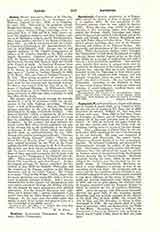

Raymond IV, OF Saint-GILLES, Count of Toulouse and of Tripoli, b. about 1043; d. at Tripoli in 1105. He was the son of Raymond III, Pons, and in 1088 succeeded his brother, William IV, who had died without male issue. From 1066 he had been Count of Rouergue, of Nimes, and of Narbonne, thus becoming one of the most powerful lords of southern France. In 1095 he received the pope, Urban II, on his own estates and took the Cross with enthusiasm, vowing never to return to his own dominions. After a pilgrimage to Chaise Dieu, he set out in October, 1096, entrusting the care of his dominions to his son Bertrand. His army was composed of Aquitanians and Provenpals, the pope’s legate, Adhemar of Monteil, Bishop of Le Puy, accompanying him. He traversed Lombardy and proceeded to Constantinople through the valleys of the Eastern Alps. After many a successful combat with the half-barbarous Slays who inhabited this region, he arrived at Durazzo, where he found letters from the Emperor Alexius inviting him to Constantinople. Raymond accepted, leaving his army, which in his absence pillaged the country, and was attacked by the imperial troops. At Constantinople Raymond refused to swear allegiance to Alexius, as most of the crusading chiefs had done. He afterwards took an active part in the expedition against Jerusalem, and, notwithstanding his rivalry with Bohemond, exercised a very great influence on the course of events. He could not prevent Bohemond from taking Antioch in 1098, and out of spite against the Norman chief he became reconciled with the Emperor Alexius, to whom he restored the city of Laodicea (February 1099). After his rupture with Bohemond, Raymond directed the great bulk of the crusaders against Jerusalem, and was actively engaged in the capture of the Holy City (July 8, 1099). He refused the title of king, and left Jerusalem to return to Constantinople in 1100. He was chosen chief of a new army of crusaders, which was destroyed by the Turks in Asia Minor. Returning to Syria in 1102, he was imprisoned at Tarsus by Tancred, and, on being released, seized Tripoli (1103), where he died two years later.
LOUIS BRÉHIER

